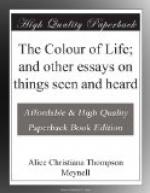The man, therefore, who has intelligently ceased to be a child scans through a shortened avenue the reaches of the past. He marvels that he was so deceived. For it was a very deception. If the Argonauts, for instance, had been children, it would have been well enough for the child to measure their remoteness and their acts with his own magnificent measure. But they were only men and demi-gods. Thus they belong to him as he is now—a man; and not to him as he was once—a child. It was quite wrong to lay the child’s enormous ten years’ rule along the path from our time to theirs; that path must be skipped by the nimble yard in the man’s present possession. Decidedly the Argonauts are no subject for the boy.
What, then? Is the record of the race nothing but a bundle of such little times? Nay, it seems that childhood, which created the illusion of ages, does actually prove it true. Childhood is itself Antiquity—to every man his only Antiquity. The recollection of childhood cannot make Abraham old again in the mind of a man of thirty-five; but the beginning of every life is older than Abraham. There is the abyss of time. Let a man turn to his own childhood—no further—if he would renew his sense of remoteness, and of the mystery of change.
For in childhood change does not go at that mere hasty amble; it rushes; but it has enormous space for its flight. The child has an apprehension not only of things far off, but of things far apart; an illusive apprehension when he is learning “ancient” history—a real apprehension when he is conning his own immeasurable infancy. If there is no historical Antiquity worth speaking of, this is the renewed and unnumbered Antiquity for all mankind.
And it is of this—merely of this—that “ancient” history seems to partake. Rome was founded when we began Roman history, and that is why it seems long ago. Suppose the man of thirty-five heard, at that present age, for the first time of Romulus. Why, Romulus would be nowhere. But he built his wall, as a matter of fact, when every one was seven years old. It is by good fortune that “ancient” history is taught in the only ancient days. So, for a time, the world is magical.
Modern history does well enough for learning later. But by learning something of antiquity in the first ten years, the child enlarges the sense of time for all mankind. For even after the great illusion is over and history is re-measured, and all fancy and flight caught back and chastised, the enlarged sense remains enlarged. The man remains capable of great spaces of time. He will not find them in Egypt, it is true, but he finds them within, he contains them, he is aware of them. History has fallen together, but childhood surrounds and encompasses history, stretches beyond and passes on the road to eternity.




